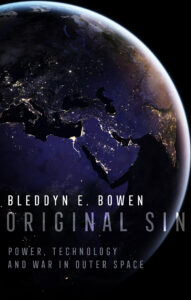Oxford Debate: The Future of War w/ Bleddyn Bowen & Lucas Kello, Chaired by Stephen Law
University of Oxford
34 Broad Street
Oxford
OX1 3BD
Space warfare expert Dr Bleddyn E. Bowen and international relations academic Professor Lucas Kello look at the future of war and debate the implications of new technologies on international conflicts.
As satellites become essential for warfare, will the next major war begin or be decided in outer space? What are the implications of developing space technology for political and military strategy and international relations? What does the rapid expansion of cyberspace mean for geopolitics? Are the hacking activities of military agents in the 2016 presidential election a sign that while the West is winning the technology race, it is losing the larger contest over cyber security? How can we best respond to growing cyber threats? Two world-leading academic experts and authors guide us through the issues.
Bleddyn E. Bowen is lecturer in international relations at the University of Leicester and an expert on space warfare, international relations in outer space, and strategic theory. He is the author of War in Space: Strategy, Spacepower, Geopolitics. Kello is associate professor of international relations at Oxford University. His publications include The Virtual Weapon and International Order. His latest book is Striking Back: The End of Peace in Cyberspace – And How To Restore It.
Discussions are chaired by Dr Stephen Law, a philosopher and academic, author of bestselling introductions to philosophy for adults and children, editor of the Royal Institute of Philosophy Journal Think, and the festival’s major projects director.
About Bleddyn E. Bowen’s Original Sin
Space technology was developed to enhance the killing power of the state. The Moon landings and the launch of the Space Shuttle were mere sideshows, drawing public attention away from the real goal: military and economic control of space as a source of power on Earth.
 Today, as Bleddyn E. Bowen vividly recounts, thousands of satellites work silently in the background to provide essential military, intelligence and economic capabilities. No major power can do without them. Beyond Washington, Moscow and Beijing, truly global technologies have evolved, from the ground floor of the nuclear missile revolution to today’s orbital battlefield, shaping the wars to come. World powers including India, Japan and Europe are fully realising the strategic benefits of commanding Earth’s ‘cosmic coastline’, as a stage for war, development and prestige.
Today, as Bleddyn E. Bowen vividly recounts, thousands of satellites work silently in the background to provide essential military, intelligence and economic capabilities. No major power can do without them. Beyond Washington, Moscow and Beijing, truly global technologies have evolved, from the ground floor of the nuclear missile revolution to today’s orbital battlefield, shaping the wars to come. World powers including India, Japan and Europe are fully realising the strategic benefits of commanding Earth’s ‘cosmic coastline’, as a stage for war, development and prestige.
Yet, as new contenders spend more and more on outer space, there is scope for cautious optimism about the future of the Space Age—if we can recognise, rather than hide, its original sin.
RSVP